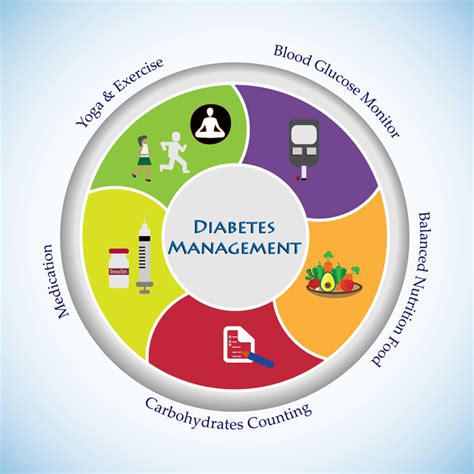Intro
Manage diabetes with a balanced diet. Discover 5 essential tips for a diabetic diet, including meal planning, carbohydrate control, and healthy food choices to regulate blood sugar levels and maintain overall wellness.
Managing diabetes requires a comprehensive approach that includes a healthy diet, regular physical activity, and monitoring of blood sugar levels. A diabetic diet is not just about cutting out sugary foods, but also about making informed choices that help regulate blood sugar, maintain a healthy weight, and prevent complications.
For individuals living with diabetes, understanding what to eat and what to avoid can be overwhelming. The key is to focus on whole, unprocessed foods like vegetables, whole grains, lean proteins, and healthy fats. These foods provide essential nutrients, fiber, and satiety, making them ideal for managing diabetes.
The importance of a well-planned diet cannot be overstated. It not only helps in managing blood glucose levels but also contributes to overall health and well-being. A diabetic diet, when combined with other lifestyle modifications, can significantly improve the quality of life for individuals with diabetes.
Understanding the Diabetic Diet

A diabetic diet is tailored to help control blood sugar levels. It emphasizes the consumption of nutrient-dense foods and limits the intake of added sugars, saturated fats, and sodium. The goal is to maintain blood glucose levels within a target range to prevent complications such as heart disease, kidney damage, and nerve damage.
Key Components of a Diabetic Diet
The diabetic diet is not a one-size-fits-all approach. It should be personalized based on factors like the type of diabetes, lifestyle, and other health conditions. However, there are some common components that are beneficial for most individuals with diabetes: - **Carbohydrate Counting:** Understanding how different carbohydrates affect blood sugar levels is crucial. Focus on whole, unprocessed foods like whole grains, fruits, and vegetables. - **Glycemic Index (GI):** Choosing foods with a low GI can help manage blood sugar levels. These foods are digested slowly, causing a gradual rise in blood sugar. - **Portion Control:** Eating the right amount of food is important to maintain a healthy weight and manage blood sugar levels.5 Tips for a Healthy Diabetic Diet

Implementing a diabetic diet can seem daunting, but with the right strategies, it can be manageable and effective. Here are five tips to help you get started:
- Eat Regular Meals: Skipping meals can lead to low blood sugar, while eating too much can cause high blood sugar. Aim for three main meals and one or two snacks per day, spaced evenly apart.
- Choose Whole Foods: Whole, unprocessed foods like vegetables, fruits, whole grains, lean proteins, and healthy fats should be the mainstay of your diet. These foods are rich in nutrients, fiber, and antioxidants.
- Limit Added Sugars: Added sugars can cause a spike in blood sugar levels. Limit foods with added sugars like sweets, sugary drinks, and refined grains.
- Stay Hydrated: Drinking enough water is essential for overall health and can help prevent high blood sugar levels. Aim for at least eight glasses of water per day.
- Plan Your Meals: Planning your meals in advance can help ensure you're making healthy choices. Consider consulting with a dietitian or a healthcare provider to create a personalized meal plan.
Benefits of a Diabetic Diet
Adhering to a diabetic diet offers numerous benefits, including: - **Better Blood Sugar Control:** A well-planned diet helps regulate blood sugar levels, reducing the risk of diabetes-related complications. - **Weight Management:** Focusing on whole, nutrient-dense foods can help with weight loss and maintenance, which is crucial for managing diabetes. - **Improved Overall Health:** A diabetic diet promotes the consumption of foods rich in essential nutrients, fiber, and antioxidants, contributing to overall health and well-being.Practical Tips for Meal Planning

Meal planning is a critical component of managing diabetes. Here are some practical tips to make meal planning easier and more effective:
- Keep it Simple: Don't feel like you need to cook elaborate meals. Simple dishes made with whole foods can be just as nutritious and delicious.
- Shop Smart: Plan your grocery list around whole foods and avoid buying processed and packaged foods.
- Cook in Bulk: Cooking meals in bulk can save time and ensure you have healthy meals ready throughout the week.
Common Mistakes in Diabetic Meal Planning
Avoiding common mistakes can help you stick to your diabetic diet and achieve your health goals: - **Not Planning for Snacks:** Snacks are an essential part of a diabetic diet. Plan healthy snacks in advance to avoid reaching for unhealthy options. - **Skipping Meals:** Skipping meals can lead to low blood sugar and overeating later in the day. Aim for regular, balanced meals. - **Not Staying Hydrated:** Adequate hydration is crucial for overall health and can help manage blood sugar levels. Drink water throughout the day.Staying Motivated on a Diabetic Diet

Staying motivated is key to successfully managing diabetes through diet. Here are some tips to help you stay on track:
- Set Realistic Goals: Setting achievable goals can help you feel a sense of accomplishment and motivation.
- Find Support: Having a support system, whether it's family, friends, or a support group, can make a significant difference in your journey.
- Celebrate Milestones: Celebrating your achievements, no matter how small, can help keep you motivated and engaged in your diabetes management plan.
Overcoming Challenges
Managing diabetes through diet can come with its challenges. Here are some strategies to overcome common obstacles: - **Be Flexible:** Life can be unpredictable, and it's essential to be flexible with your diet plan. Don't be too hard on yourself if you slip up—get back on track as soon as possible. - **Seek Professional Help:** If you're struggling to manage your diet or if you have questions, consider seeking help from a healthcare provider or a registered dietitian. - **Stay Informed:** Continuously educating yourself about diabetes management and healthy eating can help you make informed decisions and stay motivated.Conclusion and Next Steps

Managing diabetes through diet is a journey that requires patience, dedication, and the right strategies. By understanding the principles of a diabetic diet, planning meals effectively, and staying motivated, individuals with diabetes can better manage their condition and improve their overall health.
If you're looking to start your journey towards better diabetes management, consider the following next steps:
- Consult a Healthcare Provider: Discuss your diet plan and any concerns with your healthcare provider.
- Keep a Food Diary: Tracking your food intake and blood sugar levels can help you understand how different foods affect your body.
- Stay Positive: Managing diabetes is a long-term commitment. Stay positive, and don't hesitate to seek help when you need it.
What are the key components of a diabetic diet?
+A diabetic diet focuses on whole, unprocessed foods like vegetables, whole grains, lean proteins, and healthy fats, and limits added sugars, saturated fats, and sodium.
How often should I eat on a diabetic diet?
+Aim for three main meals and one or two snacks per day, spaced evenly apart, to maintain stable blood sugar levels.
What are the benefits of a diabetic diet?
+The benefits include better blood sugar control, weight management, and improved overall health, reducing the risk of diabetes-related complications.
We hope this article has provided you with valuable insights and practical tips for managing diabetes through diet. If you have any questions or would like to share your experiences, please don't hesitate to comment below. Your feedback and stories can help others on their journey to better health.
